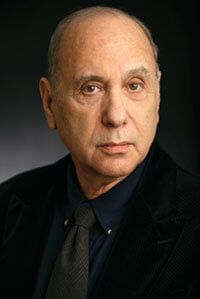Marshall Brickman ’62: The Jersey Score “Dueling Banjos” to Jersey Boys

Brickman followed Jersey Boys with The Addams Family musical, and he’s now writing a biopic about the Mamas and the Papas, with whom he played in a folk group before they became famous.© 2012 Joan Marcus
“My theory of life — and career choices — then and now is to hang out with people that I don’t mind having lunch with,” muses Marshall Brickman ’62. For the banjo-playing comedy writer, that simple guideline has resulted in an astonishing show biz career encompassing movies, bluegrass music, television, and musical theater.
In his most recent incarnation, Brickman co-created Jersey Boys, but the Tony-winning musical peppered with songs by 1960s singing group the Four Seasons represents just one of many Zeitgeist moments for the Brooklyn-raised talent.
In his Madison days, Brickman focused on folk music. His apartment served as the unofficial headquarters for the campus folk scene (and a then-unknown Bob Dylan crashed there on his way to New York City, fame, and fortune). Shortly after graduating with a double major in music and science, Brickman and Eric Weissberg x’61 recorded the New Dimensions in Banjo and Bluegrass album that provided most of the soundtrack for the 1972 movie Deliverance, including the hit “Dueling Banjos.” Not long after that, Brickman was back in New York, where he found himself crafting Johnny Carson’s Carnac the Magnificent bits as head writer for The Tonight Show. Then, Brickman teamed with Woody Allen to co-write four pictures, including Annie Hall.
Describing his collaboration with Allen, Brickman recalls, “Our work took the form of an extended dialogue. We would go out for walks and talk the thing out: ‘What if this or that happens?’ It would not look like we were working. It would look like we were having a conversation.”
About ten years ago, after directing four movies of his own, Brickman shifted creative gears when poker buddy Rick Elice sounded him out about developing a musical featuring the Four Seasons’ top-forty catalog. Brickman took a pass.
“I still wake up screaming, realizing that I almost turned the thing down,” jokes Brickman. “They wanted to use their catalog of songs and retrofit them to some fictitious plot like they did with Mamma Mia. I said, ‘Not my cup of tea.’ ”
Brickman changed his mind after hearing personal stories from band members Bob Gaudio and Frankie Valli. “Over a couple of lunches, Bob and Frankie warmed up and told us what their life was like growing up in New Jersey, being poor, trying to make it in show business, the casual involvement with the Mafia, and all this stuff that eventually found its way into the musical. Rick and I said, ‘If that’s not a home run, it’s certainly a triple, and if you let us do that, we’re in.’ ”
In 2006, Jersey Boys won four Tony Awards, including Best Musical. The show continues to enjoy touring productions worldwide as Brickman helps to shepherd the project toward a big-screen adaptation. “Songs are obviously a big part of the show, but there has to be a good story, too,” he says. “We snuck in some references in the dialogue to T.S. Eliot and Vivaldi that give the show a little more dimension than if it were simply a tribute show. The audience eats it up.”
Published in the Summer 2013 issue



Comments
David Six June 20, 2025
For those of us Badgers who literally were California Dreamin’ thanks to John and Michelle Phillips and The Mamas and the Papas, the late Marshall Brickman is noteworthy for briefly singing with John and Michelle in The New Journeymen. He left them to write for Carson, and that vacancy led Denny Doherty to join John and Michelle. Shortly thereafter, as immortalized in the song Creeque Alley, the trio became a quartet when Cass Elliot joined them in the Virgin Islands to form The Mamas and the Papas. For his role in the formation of The Mamas and the Papas, I raise my glass to Marshall Brickman. The other stuff was good, too.